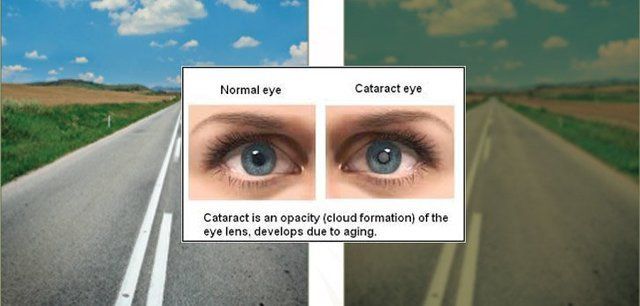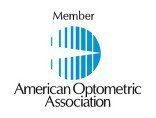Read Some FAQs About Cataracts
- Exclusive Family Eye Care Brands Available- Member of the American Optometric Association- Se Habla Español
Motivating Factor OneMotivating Factor TwoMotivating Factor Three
How a Cataract Affects Your Vision
- What are cataracts?
Cataracts are the clouding of the clear eye lens. The light entering your eye is distorted and blurs your vision. If untreated, cataracts can lead to blindness. However, most cases of blindness can be prevented through early detection, timely removal, an exceptional post-operative care from your optometrist.
- Who is affected by cataracts?
People over 55 years of age are most at risk. However, they can also occur in younger people and even newborns.
- What causes cataracts?
Most cataracts develop when aging or injury changes the tissue that makes up your eye's lens. Some inherited genetic disorders that cause other health problems can increase your risk of cataracts. Cataracts can also be caused by other eye conditions, past eye surgery, or medical conditions such as diabetes. Long-term use of steroid medications, too, can cause cataracts to develop.
As you age, the lenses in your eyes become less flexible, less transparent, and thicker. Age-related and other medical conditions cause tissues within the lens to break down and clump together, clouding small areas within the lens.
As the cataract continues to develop, the clouding becomes denser and involves a bigger part of the lens. A cataract scatters and blocks the light as it passes through the lens, preventing a sharply defined image from reaching your retina. As a result, your vision becomes blurred.
- How does the doctor diagnose cataracts?
In most cases, cataracts are extremely difficult to see with the naked eye. An optometrist often can detect cataracts years before you experience any symptoms.
To determine whether you have a cataract, your doctor reviews your medical history and symptoms and performs an eye examination. Your doctor may conduct several tests, including:
Visual acuity test: A visual acuity test uses an eye chart to measure how well you can read a series of letters. Your eyes are tested one at a time, while the other eye is covered. Using a chart or a viewing device with progressively smaller letters, your eye doctor determines if you have 20/20 vision or if your vision shows signs of impairment.
Slit-lamp examination: A slit lamp allows your eye doctor to see the structures at the front of your eye under magnification. The microscope is called a slit lamp because it uses an intense line of light, a slit, to illuminate your cornea, iris, lens, and the space between your iris and cornea. The slit allows your doctor to view these structures in small sections, which makes it easier to detect any tiny abnormalities.
Retinal exam: To prepare for a retinal exam, your eye doctor puts drops in your eyes to open your pupils wide (dilate). This makes it easier to examine the back of your eyes (retina). Using a slit lamp or other special equipment such as retinal photos, your optometrist can examine your lens for signs of a cataract.
- When do I need to have cataract surgery?
Your optometrist will determine the optimal time for cataract surgery, which varies for each patient. You will be referred to an ophthalmologist with whom Family Eye Care has a trusting, professional, co-management relationship. The ophthalmologist will do the surgery, and you will return to see the optometrist one day, one week, and one month post surgery. After your eye heals and stops changing power, eye glasses or contact lenses might be necessary.
Source: American Optometric Association
Are you suffering from cataracts?
Help is just a phone call away.
(262) 248-4878
(815) 338-0674
The staff and Dr. Heinke are amazing. They always give me excellent care. They never rush me and they are always personable and caring. I wouldn't even consider trusting my eyesight to anyone but Dr. Heinke.
- Pearl Gilley
Request an Appointment
Thank you, your information has been submitted and we will contact you shortly. If you seek immediate attention please call (815) 338-0674 or (262) 248-4878.
Family Eye Care of Woodstock and Lake Geneva
Please try again later.



